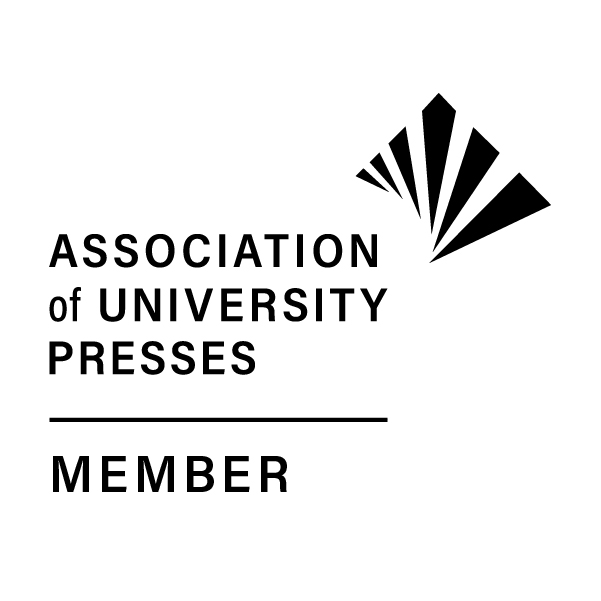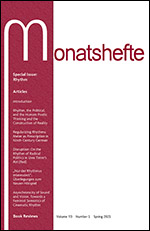|


|

Subscribe
Read the Journal Online
Submission Guidelines
Editorial Board
Receive Email Updates
Advertise in Monatshefte
Indexes/Abstracts
Current Issue TOC
Back Issues TOC
Monatshefte 2022 Subscription Rates
Institutions:
print & online $271
online only $233
Individuals:
print & online $103
online only $86
Non U.S. Postage (no postage charges for online-only subscriptions)
Airmail: add $40/yr.
Canadian Subscribers: add 5% GST. |
Monatshefte
Volume 91, Number 4, Winter 1999 Table of Contents
Texts and Documents
Kurt Fickert
Bei einer Wiedervereinigung
Kurt Fickert, born in Germany in 1920, taught for many years until his retirement in 1986 at Wittenberg University in Springfield, Ohio. He is familiar to readers of Monatshefte through his articles on modern literature, including his recent contribution on Uwe Johnson’s Jahrestage (volume 91, 2). His poetry has appeared in anthologies such as Nachrichten aus den Staaten. Deutsche Literatur in den USA (Hildesheim, Zürich, New York: Olms, 1983) and Deutsche Lyrik aus Amerika (New York: Literary Society Foundation, 1969) and, more recently, in the journal Trans-Lit. (CLN) (In German)
Articles
J. M. van der Laan
Faust’s Divided Self and Moral Inertia
Abstract:
In his famous “two souls” speech, Faust gives expression to a problem of key and paramount importance. His lament is so well known, however, that we tend to take it for granted. Instead, we might do well to take him at his word, for he acknowledges a rift at the very core of his being: the division of the self. The problem Faust states is not merely the reiteration of a philosophical dualism, of a division of the world into mind and matter (or “Geist und Natur”). To be sure, such dichotomies inhere and suggest themselves in Faust’s complaint, but the real issue concerns something rather different. Faust presents us with the incoherent individual whose inner division prevents moral decision and action. Although it is in no way a systematic, philosophical disputation on some ethical code, Goethe’s Faust nevertheless interrogates the definition of morality and the possibility of moral conduct. (JMvdL)
Raleigh Whitinger
Lou Andreas-Salomé’s Fenitschka and the Tradition of the Bildungsroman
Abstract:
Andreas-Salomé’s 1898 story evokes traditional art and narrative structures in a way that sheds light on her contribution to women’s writing and feminist theory since the 1890s, in particular with respect to the tradition of the Bildungsroman. In that context she represents a turn, around 1900, toward a “female Bildungsroman” centered on the indomitably independent heroine as well as more recent moves towards women’s writing that departs even more radically from tradition. A reading of Fenitschka focused on these elements shows her critical dialogue with male-oriented narratives in favor of a female protagonist who breaks out of those structures. This provides a contribution to the critical debate about the story’s open ending, as well as a perspective on the function of its male protagonist, Max Werner, as a vehicle not only for criticism of conventional conceptions of women, but also for insights on positive possibilities of male development. (RW)
Personalia
Introduction, German Departments in the U.S.A., German Departments in Canada, Promotions, New Appointments, Visitors, Retirements, Necrology, Doctoral Dissertations, Summary
Special Survey: Master’s Degree Programs
Statistical Retrospective: 1980–1999
Book Reviews
Index Volume 91 (1999)
|


